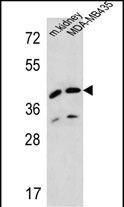
| WB | 1/1000 | Human,Mouse,Rat |
| IF | 咨询技术 | Human,Mouse,Rat |
| IHC | 咨询技术 | Human,Mouse,Rat |
| ICC | 技术咨询 | Human,Mouse,Rat |
| FCM | 咨询技术 | Human,Mouse,Rat |
| Elisa | 咨询技术 | Human,Mouse,Rat |
| Aliases | L-2-hydroxyglutarate dehydrogenase, mitochondrial, Duranin, L2HGDH, C14orf160 |
| Entrez GeneID | 79944 |
| WB Predicted band size | 50.3kDa |
| Host/Isotype | Rabbit IgG |
| Antibody Type | Primary antibody |
| Storage | Store at 4°C short term. Aliquot and store at -20°C long term. Avoid freeze/thaw cycles. |
| Species Reactivity | Human, Mouse |
| Immunogen | This L2HGDH antibody is generated from rabbits immunized with a KLH conjugated synthetic peptide between 132-159 amino acids from the Central region of human L2HGDH. |
| Formulation | Purified antibody in PBS with 0.05% sodium azide. |
+ +
以下是关于L2HGDH抗体的3篇参考文献,涵盖其应用及研究背景:
1. **文献名称**:*Mutations in L2HGDH cause D-2-hydroxyglutaric aciduria*
**作者**:Rzem R, Veiga-da-Cunha M, Noel G, et al.
**摘要**:该研究首次报道了L2HGDH基因突变导致L-2-羟基戊二酸尿症的分子机制,并通过特异性抗体检测患者细胞中L2HGDH蛋白表达缺失,证实了酶功能缺陷与疾病的相关性。
2. **文献名称**:*Diagnosis and functional analysis of L-2-hydroxyglutaric aciduria using a novel antibody against L2HGDH*
**作者**:Struys EA, Salomons GS, Gibson KM.
**摘要**:研究开发了一种针对L2HGDH的高效多克隆抗体,用于Western blot和免疫组化分析,成功在患者成纤维细胞中检测到蛋白表达异常,为疾病诊断提供了可靠工具。
3. **文献名称**:*L2HGDH deficiency in mice leads to metabolic dysregulation and neurological impairment*
**作者**:Nota B, Struys EA, Pop A, et al.
**摘要**:通过构建L2HGDH敲除小鼠模型,利用抗体分析发现脑组织中L-2-羟基戊二酸蓄积,揭示了酶缺失导致的代谢紊乱与神经退行性表型的关联。
---
**备注**:若需获取全文或更多文献,建议通过PubMed或Web of Science以“L2HGDH antibody”及“L-2-hydroxyglutaric aciduria”为关键词检索。部分研究可能侧重抗体开发或疾病机制,可根据需求筛选。
The L2HGDH (L-2-hydroxyglutarate dehydrogenase) antibody is a critical tool for studying the enzyme encoded by the L2HGDH gene, which plays a vital role in cellular metabolism. This mitochondrial enzyme catalyzes the oxidation of L-2-hydroxyglutarate (L-2-HG) to α-ketoglutarate, a key intermediate in the tricarboxylic acid (TCA) cycle. Dysregulation of L2HGDH leads to the accumulation of L-2-HG, a toxic oncometabolite associated with rare genetic disorders like L-2-hydroxyglutaric aciduria (L-2-HGA), characterized by neurodevelopmental deficits and neurodegeneration.
Research using L2HGDH antibodies focuses on understanding metabolic disorders, cancer biology, and mitochondrial dysfunction. In cancer, elevated L-2-HG levels due to L2HGDH mutations or epigenetic silencing are linked to altered DNA repair, hypoxic signaling, and tumor progression. The antibody aids in detecting L2HGDH expression in tissues or cell lines, enabling studies on enzyme localization, expression patterns, and correlations with disease phenotypes. It is also utilized to validate gene-editing models (e.g., CRISPR knockouts) and assess therapeutic interventions targeting L-2-HG metabolism.
Commercial L2HGDH antibodies are typically validated for specificity via Western blot, immunohistochemistry, or immunofluorescence. Researchers must ensure cross-reactivity checks, as homologous enzymes (e.g., D2HGDH) may confound results. Overall, this antibody is indispensable for unraveling L2HGDH’s role in metabolic health and disease.
×